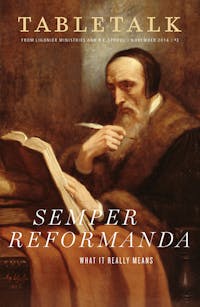
Request your free, three-month trial to Tabletalk magazine. You’ll receive the print issue monthly and gain immediate digital access to decades of archives. This trial is risk-free. No credit card required.
Try Tabletalk NowAlready receive Tabletalk magazine every month?
Verify your email address to gain unlimited access.
It doesn’t happen often, but it had happened. A book written for businessmen had jumped the fence and become something of a universal best seller. Like The Seven Habits of Highly Effective People before it, and Good to Great after it, people were talking about this book, even people in the office where I worked. As I passed by the receptionist’s desk, she had it open, and was reading it during her lunch break. “What do you think?” she asked innocently enough. “Well,” I answered, “there may well be some good wisdom in that book. If there is, however, that wisdom isn’t unique to that book. And if there is anything unique about that book, I suspect it isn’t wisdom.”
Because the Bible equips us for every good work, the truth is that we already have all that we need. Our best teachers, then, are not those bringing us new truths, but those bringing us old truths. While the world may celebrate creativity—the creation of previously unknown ideas—the church celebrates fidelity—the propagation of previously revealed ideas.
Jesus Himself, while He was noted for the authority with which He spoke, was always quick to remind His audience that He didn’t speak His own words but the words that His Father gave to Him (John 12:49). Even the notion that we must be born again in order to enter into His kingdom is something Jesus assumes the Pharisee Nicodemus must already know (John 3:10). Jesus is about the business of reminding His own of what they have forgotten.
The same, of course, is true about His call to us that we should pursue His kingdom and His righteousness. This is not some sort of course correction. The message of Jesus is not: “Well, the prophets did their best, but they steered you wrong. That’s why I have come, to tell you to stop listening to them, and start listening to Me.”
The pursuit of His kingdom—and His righteousness—has always been God’s call on our lives. Adam and Eve, as they left the garden, were called to pursue His kingdom and His righteousness. Noah, as he walked out of the ark, was called to pursue His kingdom and His righteousness. Abraham, by faith, was called righteous and was called to seek that city whose builder and maker is God.
One of the things we who are Reformed need to reform is our understanding of our place in history. Because we are twenty-first-century Westerners, we think of that which is old as passé, outdated, and that which is new as improved. The truth is that we are called to move forward. We should be enjoying in the church generational sanctification, as we stand on the shoulders of those who stood on the shoulders of those who stood on the shoulders of those who came before. But we get better not by getting newer, but by getting older. We are Reformers, not revolutionaries.
I was struck by this recently. Ascension Presbyterian Church, where I serve, is a new and small body. A year ago, we did not exist at all. Our demographic is diverse, with retired couples, college students, and even one precious yet-to-be born child of the covenant. It is our habit to seek to sing at least one psalm each Lord’s Day. At one recent gathering, we sang the “Old Hundredth”—“All People That on Earth Do Dwell.” As the last note died out, I reminded the gathered of this astonishing truth: we are singing the same song the people of God have sung for three thousand years. To be sure, we don’t know what tune David composed. And we sing an English translation rather than in Hebrew. But we are going back to the wisdom of God revealed to our fathers in the days of David.
We, too, are called to make a joyful shout to the Lord; indeed, we are the all you lands that are called to so shout. We, too, are called to serve the Lord with joy, to enter His gates with gladness, to be thankful to Him and to bless His name. We are the sheep of His pasture precisely because He is merciful.
The psalm ends with this reminder of why all our reforming is a returning: “And His truth endures to all generations.” We are not modernists trying to climb an intellectual tower of Babel. We are not evolving toward wisdom. We are instead always reforming because we are always returning—back to our Father, back to the Word, back to our primordial paradise.
In eternity, it will be the same. There, we will never have to unlearn, for we will be without sin. But we will continually learn more and more, know more and more, the glory of our heavenly Father. We will move further up and further in, growing into all that He reveals. He is wisdom precisely because He is the Ancient of Days. And to the everlasting glory of His name, we rejoice in knowing that we shall be like Him, for we shall see Him as He is. Rejoice in knowing that we are even now being reformed into His image, who is the express image of the glory of the Father.
